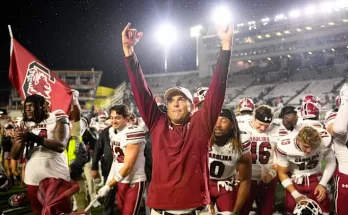Insider Reveals Why Jahmyr Gibbs Could Explode as a Receiving Threat Under New Lions Offensive Coordinator John Morton
Jahmyr Gibbs was already one of the most electrifying rookies in the NFL last season, but if the latest report from Lawrence Jackson Jr. is any indication, the Detroit Lions running back could be on the verge of an even bigger breakout year—and this time, it might come through the air. With new offensive coordinator John Morton taking the reins of Detroit’s offense, the buzz around Gibbs’ potential uptick in receptions is growing louder, and the reasons behind this expectation make perfect sense for a team poised to dominate. For Lions fans who already saw Gibbs’ game-changing speed and versatility in his rookie year, the thought of him becoming an even more dangerous dual threat is enough to spark serious excitement about what’s coming next.
Gibbs was drafted by the Lions with the 12th overall pick in the 2023 NFL Draft, a move that raised eyebrows at the time but quickly proved to be a stroke of genius. His blend of speed, agility, and receiving ability gave Detroit an immediate weapon that defenses struggled to contain. Whether lining up in the backfield or splitting out wide, Gibbs brought a dynamic element to the Lions’ attack that forced opponents to account for him on every snap. Now, with Morton stepping in to replace former offensive coordinator Ben Johnson, it appears that Detroit intends to unlock an even deeper layer of Gibbs’ skill set, particularly in the passing game.
The key to understanding this projected shift lies in John Morton’s background. Known for his creative approach to offensive football, Morton has consistently emphasized versatility and adaptability in his schemes. His previous stops, including time with the New Orleans Saints and San Francisco 49ers, showcased his ability to maximize running backs as receivers out of the backfield. Players like Reggie Bush and Alvin Kamara thrived under systems that valued route-running backs who could exploit mismatches against linebackers and safeties, and there’s every indication that Gibbs is tailor-made for such a role. Simply put, Morton knows how to feature backs with elite receiving skills, and Gibbs might be the most explosive weapon he’s ever had to deploy.
Gibbs’ rookie season gave us glimpses of that potential. He finished with over 50 receptions and close to 400 receiving yards, numbers that would be impressive for most backs but feel like just the beginning for someone with Gibbs’ talent. His ability to separate on option routes, combined with his breakaway speed after the catch, makes him a nightmare in space. Add to that his vision and patience as a ball carrier, and it’s easy to see why Detroit believes he can become even more of a focal point. If Morton follows through on the hints and reports from camp, we could see Gibbs lining up in the slot more frequently, running a wider variety of routes, and being schemed into favorable matchups that put stress on defenses in ways few teams can replicate.
This potential evolution isn’t just about padding stats; it’s about unlocking an element of unpredictability that could make Detroit’s offense almost impossible to defend. Imagine a scenario where Gibbs and wide receiver Amon-Ra St. Brown are both motioning pre-snap, creating confusion for defenders trying to sort out coverage responsibilities. Picture Gibbs releasing into the flat off play-action, with linebackers frozen by the threat of a run and defensive backs stretched thin by vertical routes downfield. These are the kinds of headaches Morton seems poised to create, and Gibbs will likely be the centerpiece of that strategy.
Another layer to this story is how Gibbs’ expanded role could impact the Lions’ overall offensive philosophy. Last season, Detroit thrived on balance, using David Montgomery’s power-running style to complement Gibbs’ speed and versatility. That tandem isn’t going anywhere, but if Gibbs becomes a more consistent receiving option, it could allow the Lions to lean even more into tempo, spacing, and quick-hitting plays that exploit defensive mismatches. In an era where the NFL is increasingly about spreading the field and creating open space for playmakers, Gibbs represents the perfect weapon for a coordinator like Morton, who understands the value of a running back who can function as a wide receiver without tipping the play call.
Of course, this also has implications for Gibbs personally. A bigger role in the passing game means more touches, more highlight-reel opportunities, and potentially a leap into the conversation as one of the NFL’s premier all-purpose backs. Names like Christian McCaffrey, Alvin Kamara, and Austin Ekeler have set the standard for running backs who dominate both as rushers and receivers, and Gibbs has the skill set to join that elite group. His ability to turn a simple swing pass into a 30-yard gain or take a linebacker deep on a wheel route gives Detroit a dimension that very few teams can match. If Morton capitalizes on that, we could be talking about Gibbs as one of the most dangerous offensive weapons in football by season’s end.
But as with any projection, execution will matter. Chemistry between Goff and Gibbs must continue to develop, and Morton will need to find the right balance to keep defenses off guard. Too much predictability in using Gibbs as a receiver could backfire, but if Detroit uses motion, formations, and varied route concepts effectively, Gibbs could easily eclipse his rookie numbers and become a nightmare for defensive coordinators. The Lions have already shown a willingness to be aggressive and creative, going for it on fourth downs and dialing up bold plays in critical moments. With Morton’s influence, that aggressive streak might take on a new flavor—one that puts the ball in Gibbs’ hands even more often.
For fans, the excitement isn’t just about stats; it’s about the promise of fireworks every Sunday. Gibbs is the kind of player who brings people out of their seats, the kind who can take a game from routine to electric in the blink of an eye. In a city that has long waited for a football renaissance, Gibbs represents a new era of hope and highlight-reel football. Combine that with a coaching staff unafraid to push boundaries, and you have a recipe for something special brewing in Detroit.
The analyst’s report isn’t just speculation—it’s rooted in logic, personnel fit, and a coordinator’s proven track record of maximizing dynamic backs. If everything clicks, Gibbs won’t just be a running back who catches passes; he’ll be a weapon who redefines the ceiling of Detroit’s offense. And for a team already trending upward, that might be the difference between being a playoff contender and being a legitimate Super Bowl threat.
As training camp unfolds and the season draws closer, all eyes will be on how Morton deploys his new toy and whether the vision of a more versatile, more explosive Gibbs becomes reality. If it does, the phrase “uptick in receptions” might prove to be an understatement. We could be witnessing the emergence of one of the most dynamic offensive players in the NFL—a player who not only changes games but changes the way we think about the Detroit Lions.
This is more than a storyline; it’s a warning to the rest of the league: Detroit’s offense isn’t just about balance and toughness anymore. With John Morton calling plays and Jahmyr Gibbs expanding his role, it’s about creativity, versatility, and relentless pressure on defenses. And if that vision plays out, the Lions won’t just be a good team—they’ll be a nightmare, with Gibbs leading the charge into a future that suddenly looks brighter than ever.



